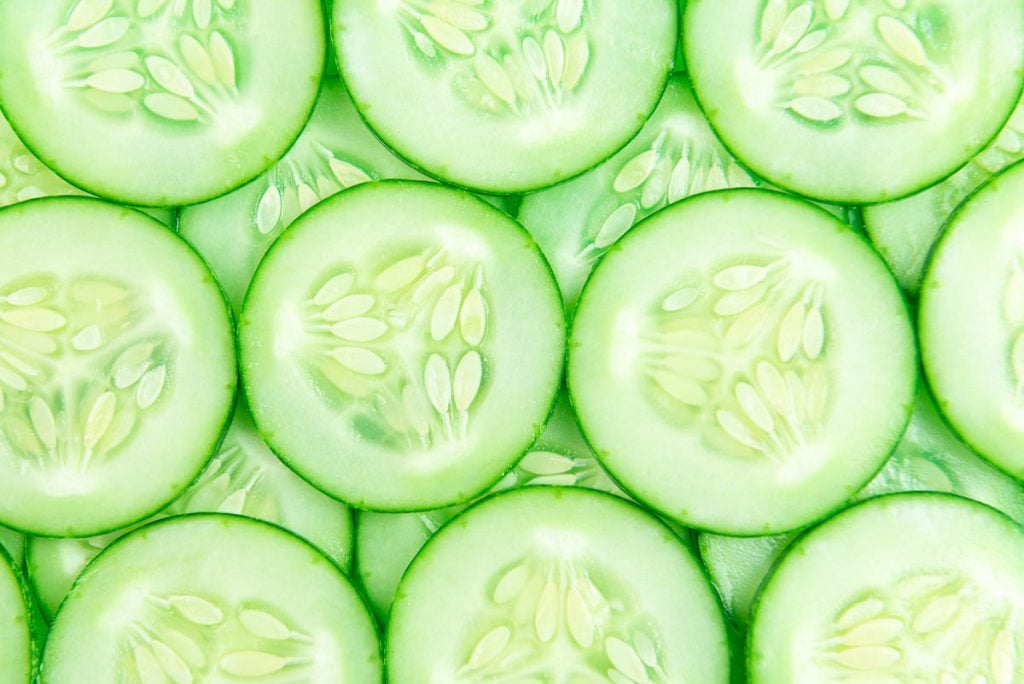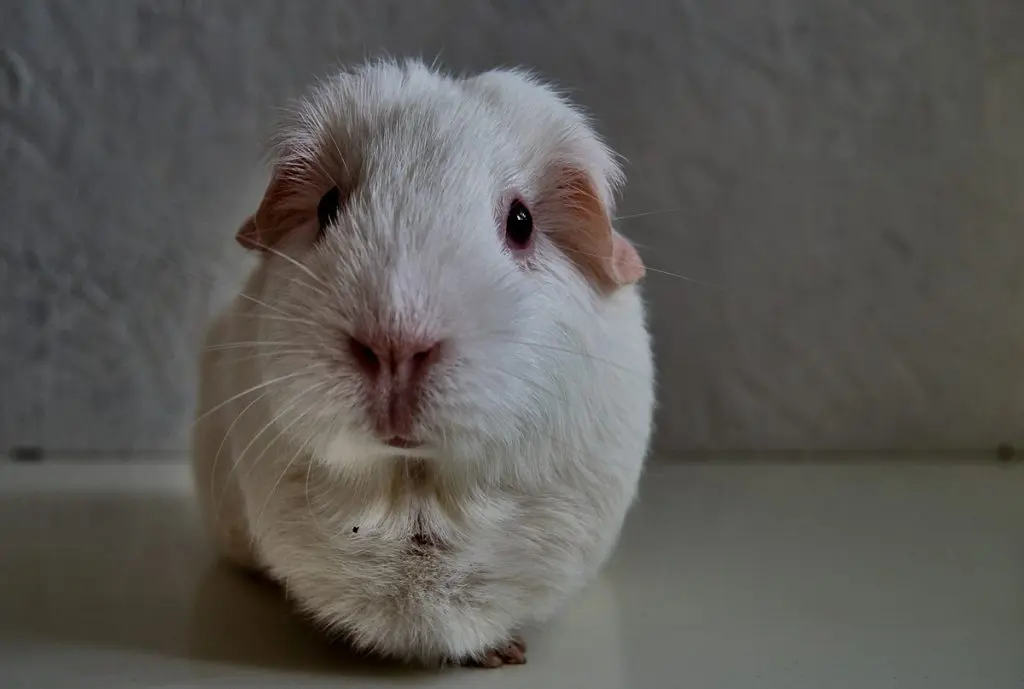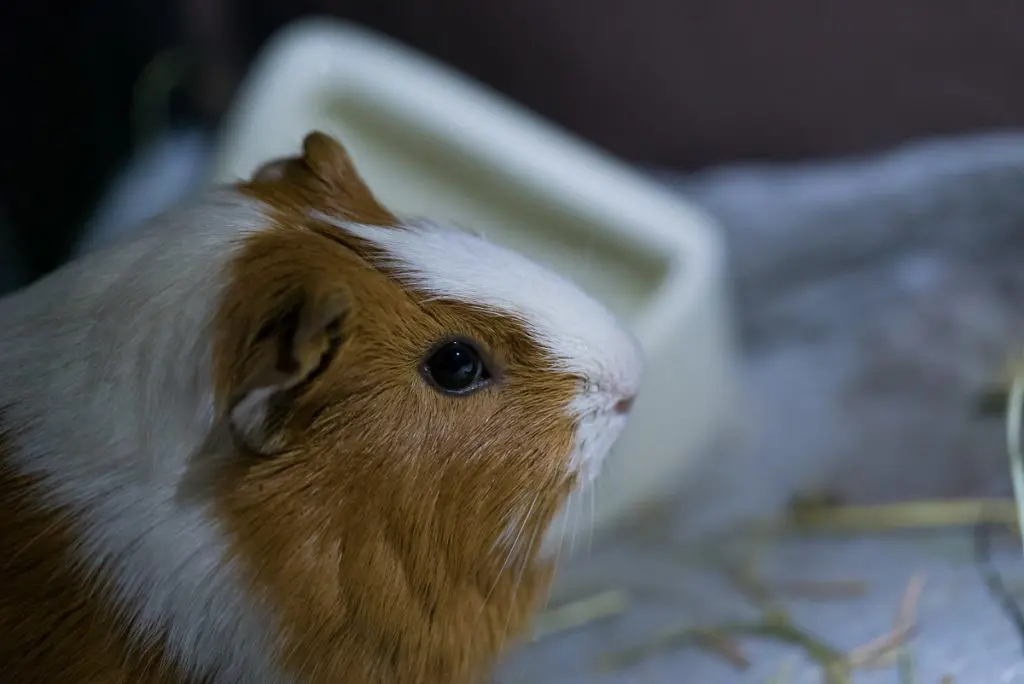How Much Cucumber Can I Feed My Guinea Pig
Jump to How-To
Guinea pigs are by far one of the most popular pocket pets. Who can resist feeding these cute little friends some sweet treats like juicy cucumber. But wait…. not all foods are safe for guinea pigs! Can guinea pigs eat cucumber?
Dr. Jess explains the answer below:

WHAT IS A GUINEA PIG?
A guinea pig is a type of pocket pet that resides in the cavie family of animals.
They are small animals that grow to a maximum of approximately 10-11 inches long, and can weigh up to 2.5 pounds as an adult.
In captivity and with proper care it is fairly common to see these pets live to 8 – 10 years of age.
One of their main anatomical (body) "quirks" is that they are constantly needing to chew in order to file down their teeth, as their teeth are constantly erupting (growing longer).
They are quite playful animals and love to socialize with the ones that they know and love.
They make great pets for responsible pet owners, and those living in small dwellings wanting a loveable pet that comes in a small package.
What Do Guinea Pigs Typically Eat?
Guinea Pigs eat an assortment of things to keep them healthy and happy.
- High-qualityguinea pig food andTimothy hay should be the main staples of their diet.
- Up to about 10% of their diet can be made up of an assortment ofvegetables and fruits, with fruits and vegetables over 12-24 hours old being discarded as soon as possible.
- They require 30 – 50 mg ofvitamin C daily from their diet, either in their guinea pig food, a vitamin supplement, or from fruits and vegetables that are high in vitamin C. I'll get to this more here in a sec…
- Guinea pigs do best with dietslow in fats and sugars.
- Clean, fresh, filtered, chlorine-freewater. 'Fresh water' means that is is changed daily. 'Changed daily' means that new water is placed into a CLEAN water dispenser!
Let's Talk Cucumber…
Cucumbers are a long, green fruit that is typically seen and used more as a vegetable in the United States, than a fruit.
They are commonly placed into categories like pickling cucumbers, seedless cucumbers, or slicing cucumbers, depending on their use.
Cucumbers are grown on a vine that trails the ground and can climb up a trellis with its tendrils, when given the opportunity.
Cucumbers have a thick, waxy-like outer rind, and change from a white or yellow color, to green when ripe.
The center of the fruit is more tender and has a mildly sweet taste.
Cucumber has a high water content and is used in a lot of cool dishes and recipes, like many salads, especially in the warmer summer months here in the states.

Cucumber Nutrition:
Livescience.com states that cucumber:
"Cucumbers are naturally low in calories, carbohydrates, sodium, fat and cholesterol….."
https://www.livescience.com/51000-cucumber-nutrition.html
Verywellfit.com describes a more detailed description of cucumber nutrition as:
"Cucumbers are crisp and refreshing, due to their high percentage of water. However, with 95% water content, you may be wondering whether cucumbers have much to offer by way of nutrition. Along with potassium, beta carotene, and vitamin K, cucumbers have several phytochemicals with promising health benefits."
https://www.verywellfit.com/cucumber-nutrition-facts-calories-and-health-benefits-4118563
- Lower or Higher Nutrient Contents: High in good things like water and lower in things that could be harmful, such as carbs and calories!
- Inflammation/Antioxidants: Multiple studies show that cucumbers are a great source of anti-inflammatory compounds that help in fighting against inflammation.
- Vitamins: A cucumber contains vitamin C and K. Guinea pigs need vitamins to stay healthy and to allow their bodies to function properly. Vitamin C helps guinea pigs stay safe and adequately protected from diseases and strengthens their immune system and they require this vitamin in their diet to stay healthy.
High Water Content:
With a high water content, you can be sure that there is only so much room for other unhealthy items… and cucumbers don't have much in the form of unhealthy components.
High water content may help your little friend stay hydrated.
Low in Calories/Fat/Carbohydrates:
Guinea pigs and other pocket pets are prone to weight gain and obesity.
Lower calorie, lower fat, and/or lower carb foods will help keep these issues at bay.
The easiest way to combat weight gain in your guinea pig is to not let them eat the weight in the first place!
Vitamins and Minerals:
The vitamins and minerals contained in cucumbers are al very important for your guinea pig in moderation.
For instance, vitamin K is essential when it comes to blood clotting. Without it, your guinea pig would die. This vitamin may also be helpful in your pet's bone health.
Antioxidants:
Multiple research studies have shown that cucumbers are a source of anti-inflammatory compounds, which effectively can help fight different forms of inflammation found inside the body.
As mentioned above, cucumbers contain these potential anti-inflammatory molecules called antioxidants.
Antioxidants are thought to help reduce inflammation inside the body by binding (attaching) to and suppressing (decreasing) inflammation-promoting molecules known as free radicals. [source]
Can Guinea Pigs Eat Cucumber?
Well after learning about some of the health benefits and some of the risks that the consumption of cucumber brings with it , wouldn't it be nice it you could just safely feed it to your piggie?
Well, you can…. in moderation.
That's right, feeding a small amount of cucumber as a treat to your guinea pig on occasion is totally fine and they will likely LOVE you for it!
Moderation = Approximately a 1-3 tablespoon-sized amount of cucumber is enough cucumber for one guinea pig.
If you have a smaller guinea pig, cut the serving in half and just give your smaller guinea pig no more than 1 teaspoon worth of cucumber 1-2 times per week as a treat.
If your pet does not eat all of their fruits and vegetables within 12-24 hours, then you need to dispose of it for them.
They will likely not eat it, and it will only sit in their cage and get old and eventually become unsafe to eat.
The rest of their diet, the other 90 or so percent, should be made up of guinea pig food and hay.
You should feed this amount no more than one to two times per week and no two days in a row.
How To Feed Cucumber to Guinea Pigs:
Materials
- 1 ripe, fresh cucumber
Tools
- 1 kitchen produce knife
- cutting board
Instructions
- Begin by washing the vegetables thoroughly as you'll need to remove any bacteria, pesticides, or other chemicals that may have been placed on the cucumber.
- Then, you'll want to cut off and discard the thick stem.
- You don't have to peel the cucumber but if you have a pickier piggie that eats around the skin then you can peel it if you feel compelled.
- Cut the cucumber into thin slices or small bite-sized cubes.
- You may want to remove the seeds present for the sake of tidiness or pickiness.
- Remove any uneaten cucumber from the cage within a few hours of serving so that bacteria does not form and grow on it.
Notes
Contact your veterinarian before changing parts of your pet's diet. Stop the feeding of cucumber immediately and contact your veterinarian if any signs of ill health appear.
How About Cucumber Seeds?
And then there are the seeds, a potential choking hazard, but not a very likely one. If you are worried about your guinea pig choking on seeds, then don't feed cucumber seeds to your guinea pig.
Either remove them before offering up cucumber pieces, or feed your guinea pig a seedless cucumber.
Even though the seeds of a cucumber are slippery, hard, and slimy, most guinea pigs will not have any issue with choking in these seeds.
Can Guinea Pigs Eat Pickles?
No, you should never feed your guinea pig a pickle.
Pickles are made with ingredients such as vinegar and spices, that can be very harmful to your pet. Never offer them a pickle, even a small piece of one!
Is Cucumber Harmful to Guinea Pigs?
Before we can decide whether cucumbers are safe to feed our guinea pigs, we need to first understand some of the risks involved if we do feed our pets cucumbers.
Yes, cucumbers can be.
Remember that too much cucumber fed to these little buddies can give them side effects like an upset stomach, gas, bloating, and diarrhea.
This can lead to a multitude of problems including things like dehydration and electrolyte imbalances that could impart a trip to the veterinary clinic for your pocket pet vet to fix.
The higher sugar content in cucumbers can also lead to some pretty big health concerns as well.
Not only does excess sugar leave your guinea pig prone to weight gain and obesity, but also diabetes and gastrointestinal (digestive) upset due to the sugar-overload in their systems.
I am not saying that you shouldn't have any concerns with feeding your guinea pig cucumber, because there are a few key things to keep in mind.
These three factors to keep in mind include:
Harmful Reason #1: Loose Stool/Diarrhea
Too much of any fruit or vegetable can produce hypermotile, or increased movement, of one's digestive tract.
Some guinea pigs are more sensitive to additional foods or changes in their diets, so they are more likely to have loose stool and in some cases, full-blown diarrhea.
Other guinea pigs will not be impacted by any additional changes in their diets.
Harmful Reason #2: Allergic Reaction to Cucumbers
A guinea pig can develop an intolerance or an allergy to any food, so there is always the possibility that your pet is allergic to cucumbers.
If you suspect your guinea pig is allergic to cucumbers do NOT feed this food to your pet.
If your guinea pig is allergic to cucumbers and accidentally ingests it, go to your nearest animal emergency room immediately.
When this happens, the attack sets off a hypersensitivity reaction and can result in any of the following symptoms:
Common symptoms of adverse/allergic reaction to food:
- Nausea/vomiting
- Diarrhea
- Itching/Increased grooming
- Fever
- Lethargy
- etc.

Can Guinea Pigs Eat Cucumber Rind?
Another issue is the rind…….
The thick rind needs to be served in small pieces and small amounts to your pet or it can become a digestive issue for them.
Cucumber rind can be served to your guinea pig. The lighter fleshy center of the fruit is easier for your pet to chew and ingest than the outermost green, thick and tough rind.
These servings of cucumber rind should be done in moderation, as the cucumber rind contains fiber which, if too much is ingested at one time, can cause diarrhea as well.
What About Cucumber Juice?
You should not offer your guinea pig cucumber juice. This is because cucumber juice has a high sugar content, which is not going to be good for your pet.
High sugar content can cause diarrhea, obesity, etc., creating more problems than good. No cucumber juice for your guinea pig please!
ALTERNATIVE FRUITS FOR GUINEA PIGS:
- Blueberries
- Pumpkin
- Squash
- Mango
- Strawberries
- Asparagus
- Grapes
- Bananas
- Melon
- Butternut Squash
- Cilantro
- Zucchini
- Oranges
Wrap up:
Weigh the pros and cons of feeding cucumber to your guinea pig before tossing them a sweet and juicy snack, and if you do decide to give them a treat, remember, it's safe in moderation.
If you have questions about your pet's diet, contact your veterinarian before changing or adding items to their diet.
If you notice any adverse reactions after feeding your pet, let your vet know immediately for help.

rodriguezruliteren1979.blogspot.com
Source: https://vetexplainspets.com/can-guinea-pigs-eat-cucumber/
0 Response to "How Much Cucumber Can I Feed My Guinea Pig"
Post a Comment